北师大版必修5同步教学课件:Unit 15 Learning Section Ⅲ Lesson 4,Communication Workshop &Culture Corner课件
文档属性
| 名称 | 北师大版必修5同步教学课件:Unit 15 Learning Section Ⅲ Lesson 4,Communication Workshop &Culture Corner课件 |
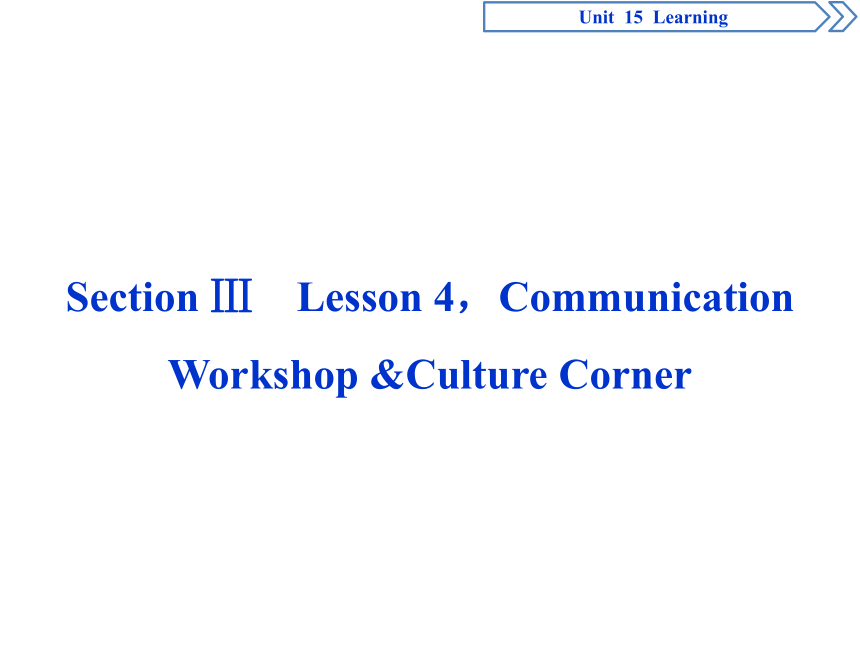
|
|
| 格式 | zip | ||
| 文件大小 | 783.9KB | ||
| 资源类型 | 教案 | ||
| 版本资源 | 北师大版 | ||
| 科目 | 英语 | ||
| 更新时间 | 2016-12-27 00:00:00 | ||
图片预览

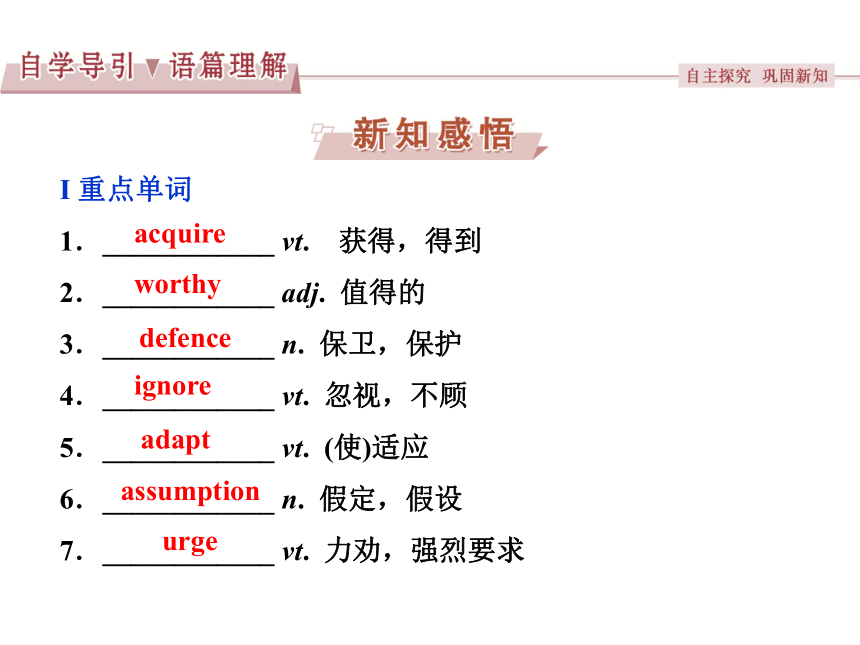
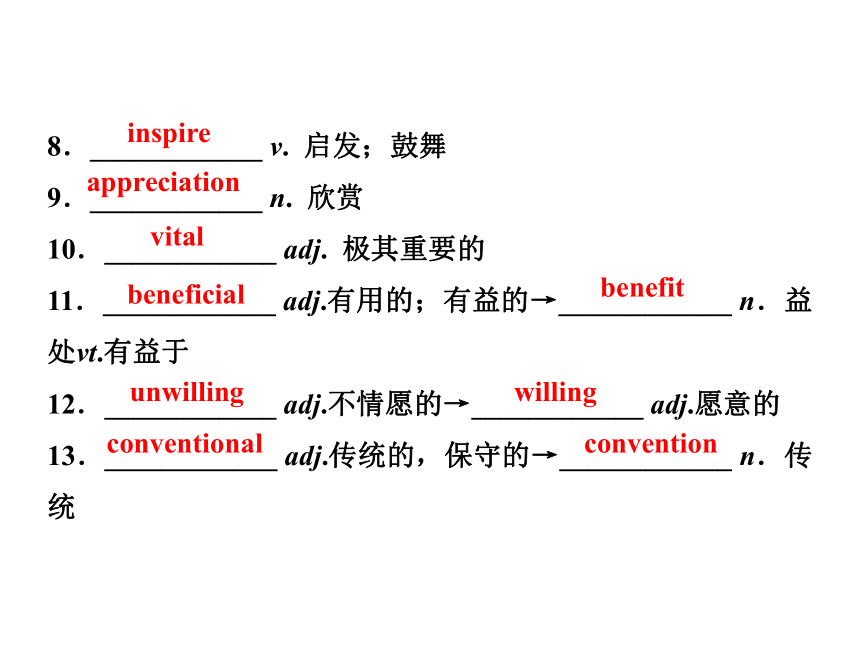
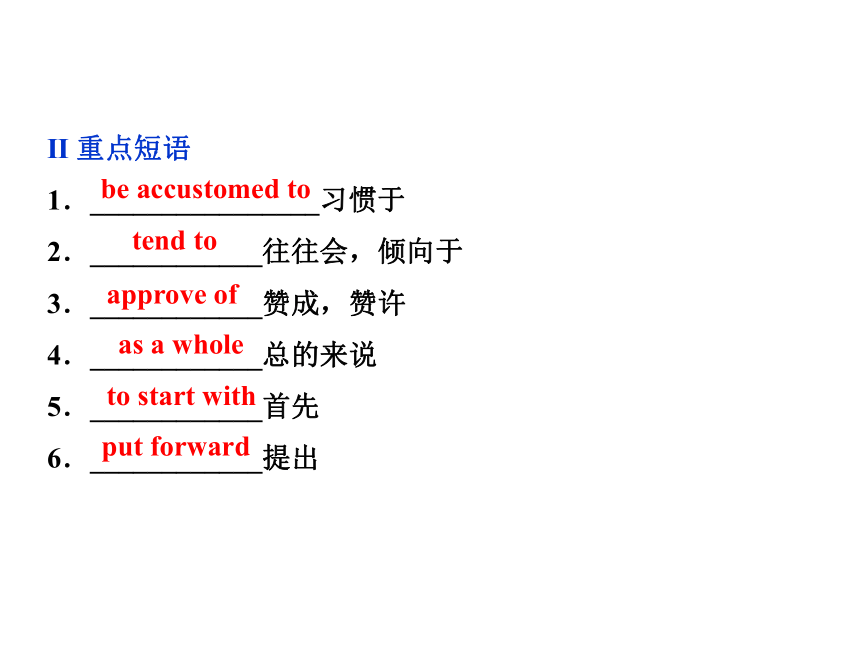
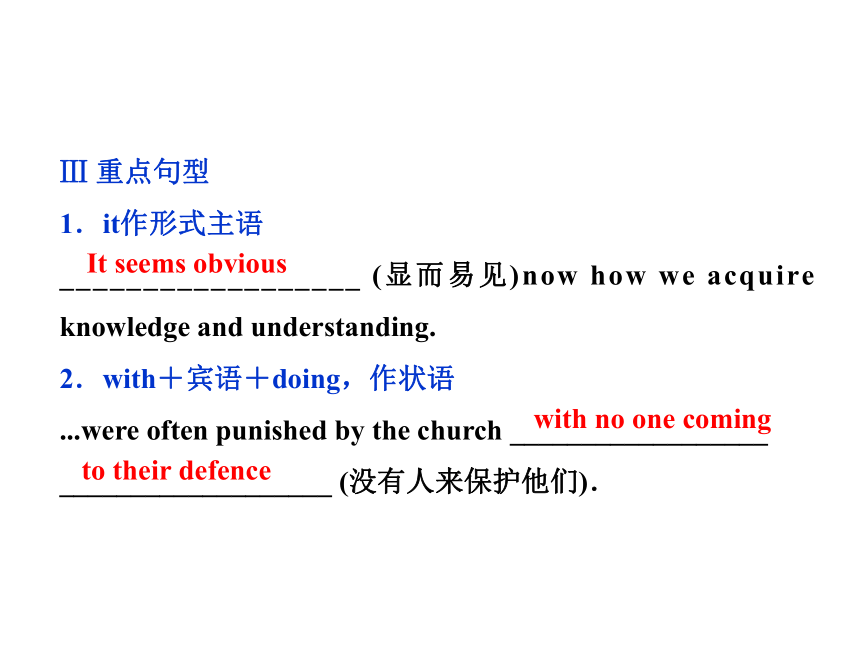
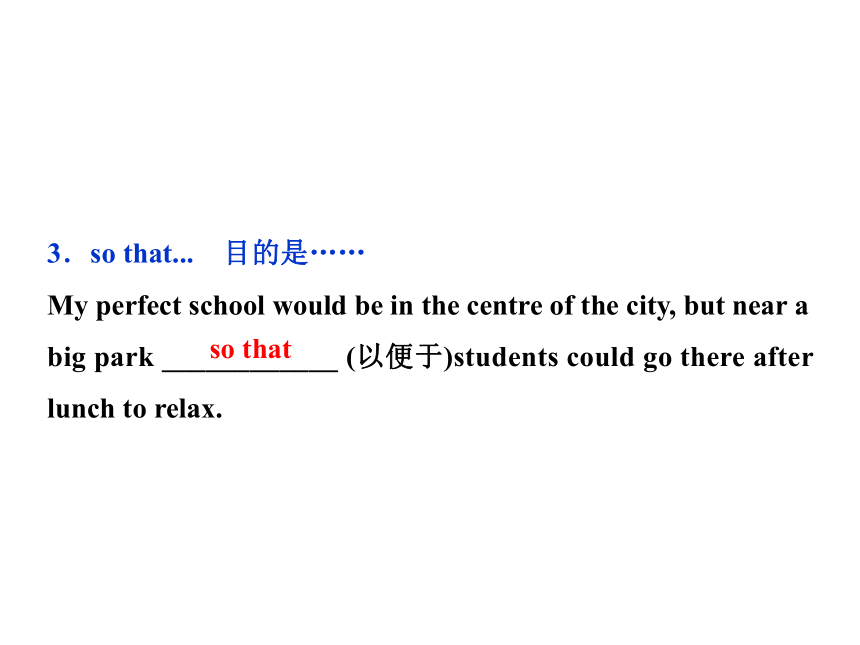
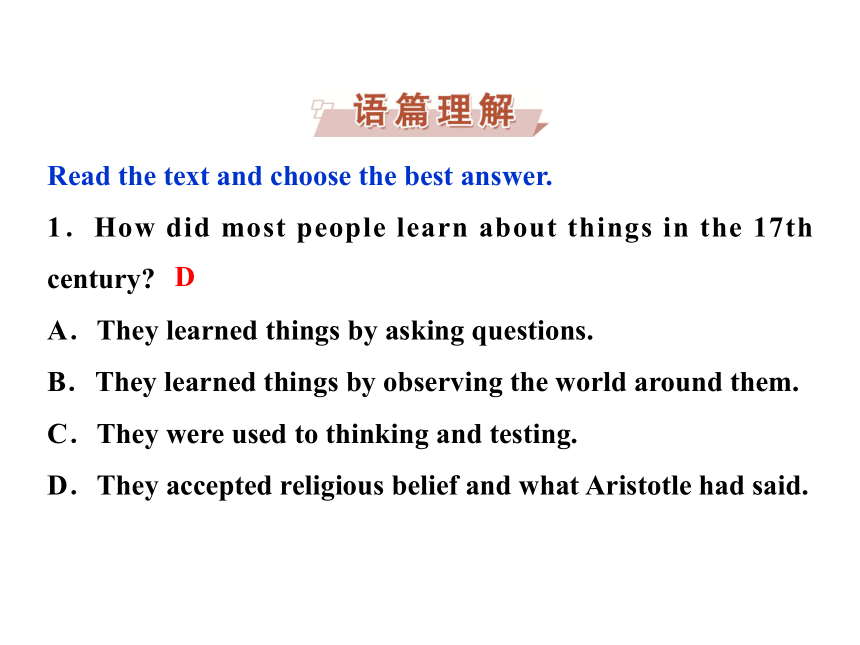
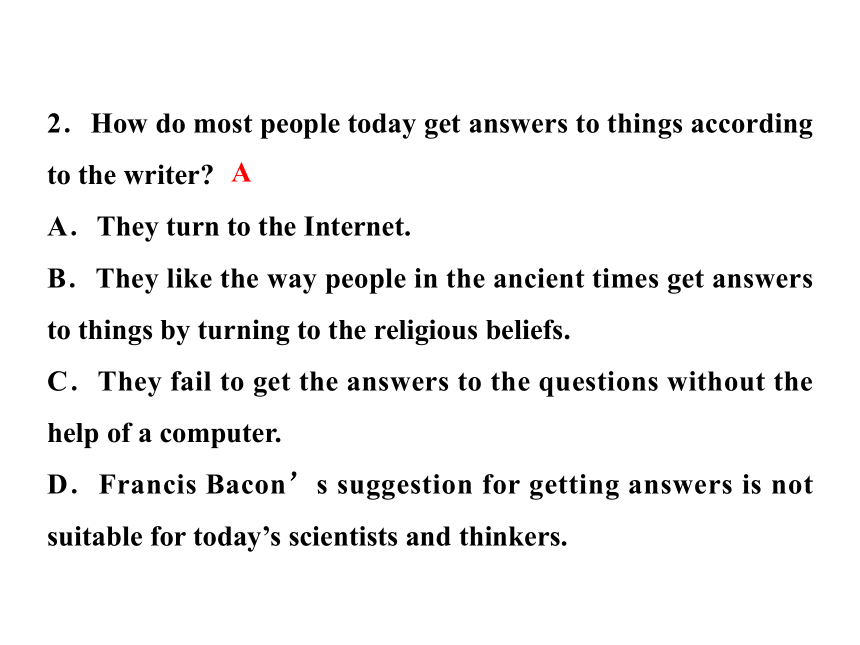

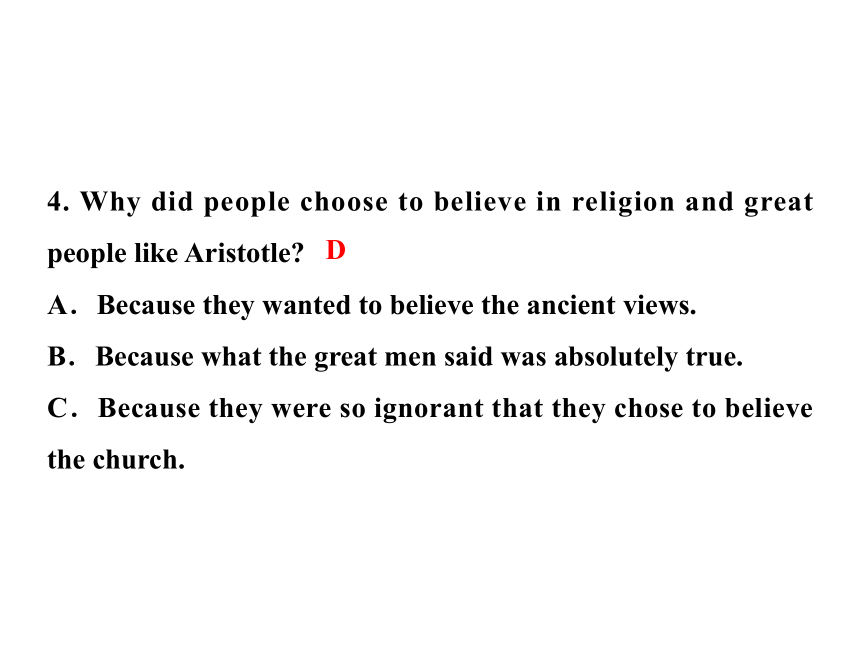
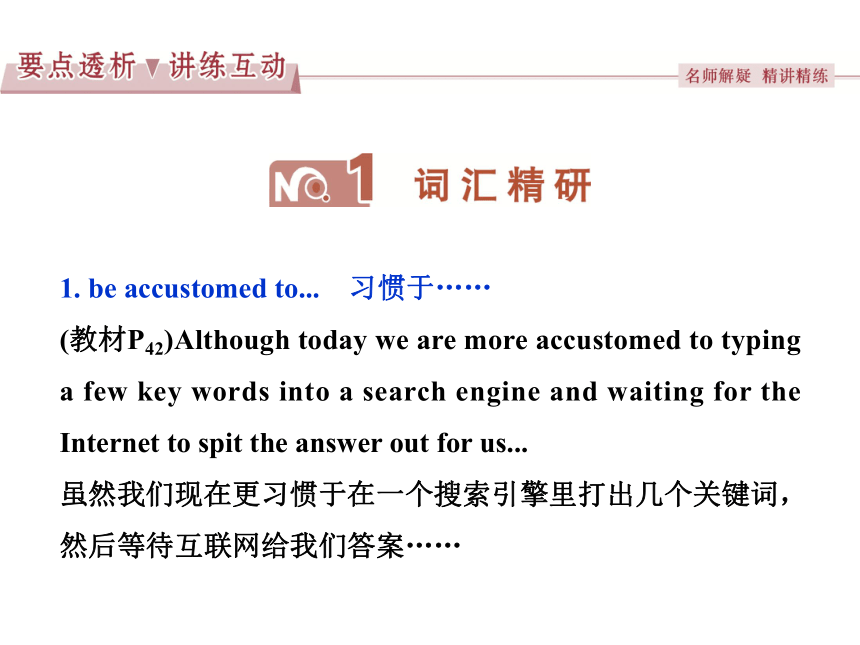
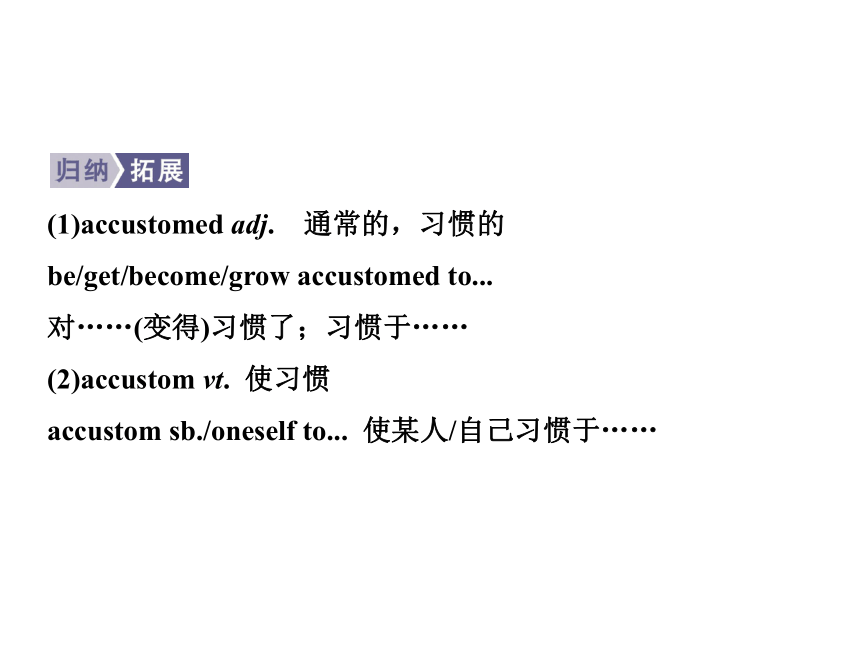
文档简介
课件60张PPT。Unit 15 LearningSection Ⅲ Lesson 4,Communication Workshop &Culture CorneracquireⅠ 重点单词
1.____________ vt. 获得,得到
2.____________ adj. 值得的
3.____________ n. 保卫,保护
4.____________ vt. 忽视,不顾
5.____________ vt. (使)适应
6.____________ n. 假定,假设
7.____________ vt. 力劝,强烈要求worthydefenceignoreadaptassumptionurge8.____________ v. 启发;鼓舞
9.____________ n. 欣赏
10.____________ adj. 极其重要的
11.____________ adj.有用的;有益的→____________ n.益处vt.有益于
12.____________ adj.不情愿的→____________ adj.愿意的
13.____________ adj.传统的,保守的→____________ n.传统inspireappreciationvitalbeneficialbenefitunwillingwillingconventionalconvention
Ⅱ 重点短语
1.________________习惯于
2.____________往往会,倾向于
3.____________赞成,赞许
4.____________总的来说
5.____________首先
6.____________提出be accustomed totend toapprove ofas a wholeto start withput forwardⅢ 重点句型
1.it作形式主语
__________________ (显而易见)now how we acquire knowledge and understanding.
2.with+宾语+doing,作状语
...were often punished by the church __________________
___________________ (没有人来保护他们).It seems obviouswith no one comingto their defence3.so that... 目的是……
My perfect school would be in the centre of the city, but near a big park ____________ (以便于)students could go there after lunch to relax.so thatRead the text and choose the best answer.
1.How did most people learn about things in the 17th century?
A.They learned things by asking questions.
B.They learned things by observing the world around them.
C.They were used to thinking and testing.
D.They accepted religious belief and what Aristotle had said.D2.How do most people today get answers to things according to the writer?
A.They turn to the Internet.
B.They like the way people in the ancient times get answers to things by turning to the religious beliefs.
C.They fail to get the answers to the questions without the help of a computer.
D.Francis Bacon’s suggestion for getting answers is not suitable for today’s scientists and thinkers.A3.Which of the following statements is TRUE about Francis Bacon?
A.Francis Bacon held an important rank under the rule of Henry Ⅷ.
B.What Francis Bacon was very interested in were bureaucratic details of the government.
C.He preferred to make assumptions about the world based on the experience of others.
D.He put forward that asking questions,thinking,observing and testing were the main features for learning.D4. Why did people choose to believe in religion and great people like Aristotle?
A.Because they wanted to believe the ancient views.
B.Because what the great men said was absolutely true.
C.Because they were so ignorant that they chose to believe the church.D1. be accustomed to... 习惯于……
(教材P42)Although today we are more accustomed to typing a few key words into a search engine and waiting for the Internet to spit the answer out for us...
虽然我们现在更习惯于在一个搜索引擎里打出几个关键词,然后等待互联网给我们答案……(1)accustomed adj. 通常的,习惯的
be/get/become/grow accustomed to...
对……(变得)习惯了;习惯于……
(2)accustom vt. 使习惯
accustom sb./oneself to... 使某人/自己习惯于…… ①“We are accustomed to having one thing in our pocket to do all these things,” he added.
“我们习惯于打包做所有的事情,”他补充说。
②She was a person accustomed to ____________ (have)eight hours’ sleep a night.
她是那种习惯每晚睡八个小时的人。
③He quickly got accustomed to the strong academic atmosphere and colorful activities in the college.他很快适应了大学里的浓厚的学术氛围和丰富多彩的活动。having④He had to accustom ____________ (he) to the cold weather.
他不得不使自己习惯于寒冷的天气。
⑤The old man was sitting in his ____________ (accustom) chair the other day.
不久前的一天,这位老人坐在他经常坐的椅子上。himselfaccustomed ——单句语法填空
(1)The girl has been accustomed to ____________ (live) in this small village.
(2)____________ (accustom) to this new life, the young man was very happy.
(3)My friend and I agreed to meet at the ____________ (accustom) time.livingAccustomedaccustomed2.defence n.保卫;防御
(教材P42)…were often punished by the church with no one coming to their defence.
……常常被教会惩罚,没人为他们辩护。
(1)in defence of 保护
in one’s defence 站在某人一边,为某人辩护
(2)defend v. 保卫,防御
defend sb./sth.from/against sth.
保护某人/某物免受伤害
defend oneself 自卫 ①The man has been fierce in defence of the present system.这个人极力为现在的体系辩护。
②That day only several people spoke in my ____________ (defend).那天只有几个人为我辩护。
③Thousands of young men came forward, willing to defend their country.
成千上万的年轻人挺身而出,愿意保卫自己的国家。defence④Steps are being taken to defend the city ____________attack.
正在采取措施保护该城市免受袭击。
⑤You have a right to defend ____________ (you) if you are being attacked.
如果你受到攻击,有权为自己辩护。againstyourself ——单句语法填空
(1)We should defend our country ____________ enemies.
(2)Humour is a more effective ____________ (defend)than violence.
(3)The man stood up in ____________ (defend) of the young boy.againstdefencedefence3.tend to 往往会,倾向于
(教材P42)The church and many people tended to ignore the facts and were unwilling to challenge what they had always comfortably believed. 教会和很多人往往会忽视事实,他们不愿向自己一直相信的事实发出挑战。(1)tend vt. 照管;护理(=take care of/look after)
tend to do sth. 有做某事的倾向;有做某事的趋势
tend towards 趋向;走向;趋于……(=tend to)
(2)tendency n. 趋势;倾向
have a tendency to do sth.
有做某事的倾向 ①The gym tends to get very busy at about six o’clock.
健身房六点钟左右往往会很热闹。
②We tend ____________ (take)technology for granted nowadays.现在我们往往会认为技术是理所当然的。
③I think they will tend ____________ stricter controls.
我认为他们将采取更严格的控制措施。to taketo/towards④There is a ____________ (tend) for a new manager to make changes.
每个新经理上任后都可能进行改革。
⑤You have a tendency to avoid arguments.
你总想尽量避免争吵。tendency4.ignore v.忽视;不理睬
(教材P42)The church and many people tended to ignore the facts and were unwilling to challenge what they had always comfortably believed. 教会和很多人往往会忽视事实,他们不愿向自己一直相信的事实发出挑战。(1)ignore doing sth. 忽视某事,对……不予理会
(2)ignorant adj. 无知的,不知道的
be ignorant of sth. 对……不了解,对……一无所知
(3)ignorance n. 忽视,不理睬
be in ignorance of... 对……完全不知情 ①We attach too much importance to our phones so that we ignore our friends.
我们太重视手机而忽略了我们的朋友。
②To ignore the problem only made the matter worse.
忽视这个问题只会使事情更糟糕。
③He is ____________ (ignore) of even the simple rules.
他甚至对简单的规则都一无所知。ignorant④There is a lot of public ____________ (ignore) about how the disease is spread.公众对该病的传播方式知之甚少。
⑤His comments showed his total ignorance of the situation.他的评论表明他对形势毫不知情。ignorance5.assumption n.假定,假想
(教材P42)They preferred to make assumptions about the world based on the experience of others.
他们宁愿以前人的经验为依据对世界作出假设。(1)make an assumption/make assumptions about/that... 对……作出假设,假定……
(2)assume vt. 假设,假定
assume sb./sth.to be...
假定/假设某人/某物是……
assume that... 假设……,认为……
It is assumed that... 人们认为……;假定……
Assuming /Supposing/Provided that...
假定/假如…… ①The third assumption mentioned above is not strictly accurate.上述第三个假设并不是完全正确的。
②A lot of people make the assumption ____________ poverty only exists in the Third World.
许多人认为贫困仅仅存在于第三世界。
③I have always assumed the girl ____________ (be)an American.
我一直以为这个女孩是美国人。
④Assume that it is true, what should we do now?
=____________ (assume) that it is true, what should we do now?假定那是真的,我们现在该怎么办?thatto beAssuming6.approve of 赞同,赞许
(教材P42)At first,people approved of his studies and urged him to continue,but later when he proved Aristotle wrong... 起初,人们赞同他的研究,并强烈要求他继续下去,但后来当他证明亚里士多德是错误的时候……
(1)approve of sb./sth. 赞成,同意某人/某事
(2)approval n. 赞成,同意;批准,许可
win/earn one’s approval 得到某人的同意/赞许
meet with one’s approval 得到某人的批准 ①Though not everyone approved of the new dance, the dance did find enough supporters to make it popular.
虽然不是每个人都同意新的舞蹈,但是该舞蹈的确找到了足以使它受欢迎的支持者。
②Before building work began,a lot of people didn’t want it though the plans _______________ (approve).
建筑工作开始之前,虽然这些计划已被批准,但很多人还是不想建这个大厦。were approved③He showed his ____________ (approve)by smiling.
他以微笑表示赞成。
④I hope my new plan will meet with the manager’s approval.我希望我的新计划会得到经理的批准。approval7.urge vt.敦促;鼓励;极力主张;驱策,促使
n.强烈的愿望
(教材P42)At first,people approved of his studies and urged him to continue...
起初,人们赞同他的研究并鼓励他继续进行……(1)urge sb.to do sth. 催促某人做某事
urge sth.on/upon sb. 向某人极力陈述某事
urge that... 主张……;力劝……
(2)have an urge to do sth. 渴望做某事
(3)urgent adj. 紧急的 ①The doctor urged me to have an X-ray test and then he could make a conclusion.
医生敦促我做一个X光检查,然后他才能得出结论。
②He urged ____________ his pupils the importance of hard work.
他向学生们强调用功的重要性。
③It was very late and Tom was fighting the urge to fall asleep.已经很晚了,汤姆正在与强烈的睡意作斗争。
④People there are in ____________ (urge) need of food and water.那里的人们急需食物和水。onurgenturge后跟that从句时,从句中使用虚拟语气,谓语动词为should+动词原形,should可省略。
⑤I urged that we ___________________________to prevent such thing happening again.
我极力主张应该立刻采取行动阻止这样的事情再发生。(should)take immediate action Mr.Zhang often urged on his daughter the importance of hard work.He also urged that his daughter (should) study abroad.Whenever he talked to her on the phone,he would urge her to make preparations. To his great joy,his daughter went to study in Britain at last.8.adapt vt.(使)适应;改,修改,改编,改写(剧本等)
(经典例句)For a start,it would be hard adapting to a new culture. 在一开始,新的文化让人感觉很难适应。
(1)adapt oneself to sth. 使某人自己适应或习惯于某事
adapt sth.to 使某事物适应或适合
adapt for... 使适合于……;为……改编(改写)
adapt from... 根据……改写(改编)
(2)adaptation n. 改编本 ①It was hard for her to adapt herself to the new work.
对她来说适应这个新工作是很难的。
②We must adapt our thinking _______ the new condition.
我们必须使自己的思想适应新的情况。
③This novel has been adapted for radio from the Russian original.这部小说已由俄文原著改编成无线电广播节目。to④As far as I know,the TV play is adapted ____________ a true story.据我所知,这部电视剧改编自真人真事。
⑤The play was an ____________ (adapt)of Jiang Shengnan’s novel.
这部电视剧是由蒋胜男的小说改编的。fromadaptation9.as a whole 总的来说
(经典例句)As a whole, I think that studying abroad can be a positive experience.
总的来说,我认为去国外学习是一次有意义的经历。
(1)on the whole 大体上;基本上
the whole of... 整个……
(2)generally speaking 一般来说 ①His views are not popular with the townspeople as a whole.
他的观点总体上不受市民的欢迎。
②It was a pretty good meeting ________the whole.
总的来说,这是一次成功的会议。
③I was off work for ________ whole of January.
整个1月份我都没有上班。
④Generally speaking, I like to go to swim in this river in June.
一般来说,我喜欢六月份到这条河里游泳。onthe10.appreciation n.欣赏;感激
(教材P45)However,there would also be some new optional subjects,for example,literary appreciation,astronomy,biochemistry,etc. 但是,也应有一些新的可供选择的课程,如文学鉴赏、天文学、生物化学等。(1)in appreciation of... 因感激……
(2)appreciate v. 欣赏;感激;领会;鉴别
appreciate+n./pron./v.-ing
重视,感激
I would appreciate it if... 如果……我将不胜感激 ①I will invite you to dinner in appreciation of your hard work this week.
为了对你本周的辛勤工作表示感谢,我想请你吃晚餐。
②One’s ____________ (appreciate) of literature depends on one’s knowledge and taste.
一个人的文学欣赏能力取决于他的知识和品味。
③We appreciate your apologies and goodwill,but we hope that you can figure out a good way of settling the matter.
你的道歉和好意我们心领了,但我们希望你能想出解决这个问题的好方法。appreciation④I really appreciate ____________ (invite) here to give you a speech.被邀请到这里来做演讲,我真的很感激。
⑤I would appreciate _____ greatly if you can take action at once.如果您能马上采取行动,我将非常感谢!being invitedit ——句型转换
If we hear from you again,we would appreciate.
→We would appreciate ____________you again.
→We would appreciate ____________we could hear from you again.hearing fromit if1. (教材P42)At that time,people believed more in religion than in facts and people like Galileo Galilei(1564-1642),who proved scientific ideas such as“the Earth is not the centre of the universe”,were often punished by the church with no one coming to their defence.
那时,人们更多地相信宗教,而不是事实,像伽利略(1564~1642)这样证明了诸如“地球不是宇宙的中心”等科学观点的人常常被教会惩罚,而没有人站出来保护他们。with no one coming to their defence是with的复合结构在句中作状语。在“with+宾语+宾语补足语”结构中,宾语补足语可以是分词、介词短语、副词、形容词和不定式。 ①With the boy leading the way, we found the house easily.
由这个男孩带路,我们很容易找到了那幢房子。
②With so much work ____________ (fill) his mind, he couldn’t sleep well.心中装着那么多工作,他根本睡不好。
③He usually sleeps with the windows open.
他通常开着窗户睡觉。filling④The young man was brought in with his hands ___________ (tie) behind his back.
手被绑在背后,这个年轻人被带了进来。
⑤With so many problems ____________ (settle), the man was very upset.
有那么多的问题需要解决,这个人感到非常烦躁。tied to settle ——单句语法填空
(1)With the goods ____________ (buy), the woman left the supermarket.
(2)With so many letters ____________ (answer), the girl had to stay up late.
(3)With his finger ____________ (point) at the picture, the guide gave us a brief description.boughtto answerpointing2. (教材P42)It is not surprising that people wanted to believe these ancient views as they had been put forward by the great philosopher Aristotle(384-322 BC).
因为这些观点是伟大的哲学家亚里士多德(公元前384~公元前322)提出来的,人们愿意相信这些古老的观点,这也不足为奇。(1)这是一个主从复合句。
It is+adj.+that...在该句型中it是形式主语,真正的主语是
that引导的主语从句。
(2)用于该句型的常见形容词有:necessary,strange,clear,possible,natural,important,likely,obvious等。作为形式主语的it并无实际意义,只是为满足语法上的需要,避免句子头重脚轻,它代替的是句子的逻辑主语。(3)it作形式主语的句式还有:
①It+be+过去分词+that...
常见的过去分词有:said,reported,believed,supposed,ordered,(well)known,suggested等。
②It+不及物动词+that...
常见的不及物动词(短语):seem,appear,happen,turn out,occur to等。
③It+be+名词短语+that...
常见的名词短语有:a pity,a fact,a wonder,a surprise,no wonder等。①It is important that he should know about this.
他应该知道这件事,这是重要的。
②It is said ____________ the famous actor has got married.
据说,这位著名演员已经结婚了。
③It seemed that she was sleeping then.
那时她好像在睡觉。that④It does not seem _______________ (do)as much good as they hoped.
看起来这并没有像他们期望的那样起到很好的效果。
⑤It __________________Bob should have won the game.
鲍勃会赢得这场比赛,这不足为奇。to have doneis no surprise that本部分内容讲解结束按ESC键退出全屏播放
1.____________ vt. 获得,得到
2.____________ adj. 值得的
3.____________ n. 保卫,保护
4.____________ vt. 忽视,不顾
5.____________ vt. (使)适应
6.____________ n. 假定,假设
7.____________ vt. 力劝,强烈要求worthydefenceignoreadaptassumptionurge8.____________ v. 启发;鼓舞
9.____________ n. 欣赏
10.____________ adj. 极其重要的
11.____________ adj.有用的;有益的→____________ n.益处vt.有益于
12.____________ adj.不情愿的→____________ adj.愿意的
13.____________ adj.传统的,保守的→____________ n.传统inspireappreciationvitalbeneficialbenefitunwillingwillingconventionalconvention
Ⅱ 重点短语
1.________________习惯于
2.____________往往会,倾向于
3.____________赞成,赞许
4.____________总的来说
5.____________首先
6.____________提出be accustomed totend toapprove ofas a wholeto start withput forwardⅢ 重点句型
1.it作形式主语
__________________ (显而易见)now how we acquire knowledge and understanding.
2.with+宾语+doing,作状语
...were often punished by the church __________________
___________________ (没有人来保护他们).It seems obviouswith no one comingto their defence3.so that... 目的是……
My perfect school would be in the centre of the city, but near a big park ____________ (以便于)students could go there after lunch to relax.so thatRead the text and choose the best answer.
1.How did most people learn about things in the 17th century?
A.They learned things by asking questions.
B.They learned things by observing the world around them.
C.They were used to thinking and testing.
D.They accepted religious belief and what Aristotle had said.D2.How do most people today get answers to things according to the writer?
A.They turn to the Internet.
B.They like the way people in the ancient times get answers to things by turning to the religious beliefs.
C.They fail to get the answers to the questions without the help of a computer.
D.Francis Bacon’s suggestion for getting answers is not suitable for today’s scientists and thinkers.A3.Which of the following statements is TRUE about Francis Bacon?
A.Francis Bacon held an important rank under the rule of Henry Ⅷ.
B.What Francis Bacon was very interested in were bureaucratic details of the government.
C.He preferred to make assumptions about the world based on the experience of others.
D.He put forward that asking questions,thinking,observing and testing were the main features for learning.D4. Why did people choose to believe in religion and great people like Aristotle?
A.Because they wanted to believe the ancient views.
B.Because what the great men said was absolutely true.
C.Because they were so ignorant that they chose to believe the church.D1. be accustomed to... 习惯于……
(教材P42)Although today we are more accustomed to typing a few key words into a search engine and waiting for the Internet to spit the answer out for us...
虽然我们现在更习惯于在一个搜索引擎里打出几个关键词,然后等待互联网给我们答案……(1)accustomed adj. 通常的,习惯的
be/get/become/grow accustomed to...
对……(变得)习惯了;习惯于……
(2)accustom vt. 使习惯
accustom sb./oneself to... 使某人/自己习惯于…… ①“We are accustomed to having one thing in our pocket to do all these things,” he added.
“我们习惯于打包做所有的事情,”他补充说。
②She was a person accustomed to ____________ (have)eight hours’ sleep a night.
她是那种习惯每晚睡八个小时的人。
③He quickly got accustomed to the strong academic atmosphere and colorful activities in the college.他很快适应了大学里的浓厚的学术氛围和丰富多彩的活动。having④He had to accustom ____________ (he) to the cold weather.
他不得不使自己习惯于寒冷的天气。
⑤The old man was sitting in his ____________ (accustom) chair the other day.
不久前的一天,这位老人坐在他经常坐的椅子上。himselfaccustomed ——单句语法填空
(1)The girl has been accustomed to ____________ (live) in this small village.
(2)____________ (accustom) to this new life, the young man was very happy.
(3)My friend and I agreed to meet at the ____________ (accustom) time.livingAccustomedaccustomed2.defence n.保卫;防御
(教材P42)…were often punished by the church with no one coming to their defence.
……常常被教会惩罚,没人为他们辩护。
(1)in defence of 保护
in one’s defence 站在某人一边,为某人辩护
(2)defend v. 保卫,防御
defend sb./sth.from/against sth.
保护某人/某物免受伤害
defend oneself 自卫 ①The man has been fierce in defence of the present system.这个人极力为现在的体系辩护。
②That day only several people spoke in my ____________ (defend).那天只有几个人为我辩护。
③Thousands of young men came forward, willing to defend their country.
成千上万的年轻人挺身而出,愿意保卫自己的国家。defence④Steps are being taken to defend the city ____________attack.
正在采取措施保护该城市免受袭击。
⑤You have a right to defend ____________ (you) if you are being attacked.
如果你受到攻击,有权为自己辩护。againstyourself ——单句语法填空
(1)We should defend our country ____________ enemies.
(2)Humour is a more effective ____________ (defend)than violence.
(3)The man stood up in ____________ (defend) of the young boy.againstdefencedefence3.tend to 往往会,倾向于
(教材P42)The church and many people tended to ignore the facts and were unwilling to challenge what they had always comfortably believed. 教会和很多人往往会忽视事实,他们不愿向自己一直相信的事实发出挑战。(1)tend vt. 照管;护理(=take care of/look after)
tend to do sth. 有做某事的倾向;有做某事的趋势
tend towards 趋向;走向;趋于……(=tend to)
(2)tendency n. 趋势;倾向
have a tendency to do sth.
有做某事的倾向 ①The gym tends to get very busy at about six o’clock.
健身房六点钟左右往往会很热闹。
②We tend ____________ (take)technology for granted nowadays.现在我们往往会认为技术是理所当然的。
③I think they will tend ____________ stricter controls.
我认为他们将采取更严格的控制措施。to taketo/towards④There is a ____________ (tend) for a new manager to make changes.
每个新经理上任后都可能进行改革。
⑤You have a tendency to avoid arguments.
你总想尽量避免争吵。tendency4.ignore v.忽视;不理睬
(教材P42)The church and many people tended to ignore the facts and were unwilling to challenge what they had always comfortably believed. 教会和很多人往往会忽视事实,他们不愿向自己一直相信的事实发出挑战。(1)ignore doing sth. 忽视某事,对……不予理会
(2)ignorant adj. 无知的,不知道的
be ignorant of sth. 对……不了解,对……一无所知
(3)ignorance n. 忽视,不理睬
be in ignorance of... 对……完全不知情 ①We attach too much importance to our phones so that we ignore our friends.
我们太重视手机而忽略了我们的朋友。
②To ignore the problem only made the matter worse.
忽视这个问题只会使事情更糟糕。
③He is ____________ (ignore) of even the simple rules.
他甚至对简单的规则都一无所知。ignorant④There is a lot of public ____________ (ignore) about how the disease is spread.公众对该病的传播方式知之甚少。
⑤His comments showed his total ignorance of the situation.他的评论表明他对形势毫不知情。ignorance5.assumption n.假定,假想
(教材P42)They preferred to make assumptions about the world based on the experience of others.
他们宁愿以前人的经验为依据对世界作出假设。(1)make an assumption/make assumptions about/that... 对……作出假设,假定……
(2)assume vt. 假设,假定
assume sb./sth.to be...
假定/假设某人/某物是……
assume that... 假设……,认为……
It is assumed that... 人们认为……;假定……
Assuming /Supposing/Provided that...
假定/假如…… ①The third assumption mentioned above is not strictly accurate.上述第三个假设并不是完全正确的。
②A lot of people make the assumption ____________ poverty only exists in the Third World.
许多人认为贫困仅仅存在于第三世界。
③I have always assumed the girl ____________ (be)an American.
我一直以为这个女孩是美国人。
④Assume that it is true, what should we do now?
=____________ (assume) that it is true, what should we do now?假定那是真的,我们现在该怎么办?thatto beAssuming6.approve of 赞同,赞许
(教材P42)At first,people approved of his studies and urged him to continue,but later when he proved Aristotle wrong... 起初,人们赞同他的研究,并强烈要求他继续下去,但后来当他证明亚里士多德是错误的时候……
(1)approve of sb./sth. 赞成,同意某人/某事
(2)approval n. 赞成,同意;批准,许可
win/earn one’s approval 得到某人的同意/赞许
meet with one’s approval 得到某人的批准 ①Though not everyone approved of the new dance, the dance did find enough supporters to make it popular.
虽然不是每个人都同意新的舞蹈,但是该舞蹈的确找到了足以使它受欢迎的支持者。
②Before building work began,a lot of people didn’t want it though the plans _______________ (approve).
建筑工作开始之前,虽然这些计划已被批准,但很多人还是不想建这个大厦。were approved③He showed his ____________ (approve)by smiling.
他以微笑表示赞成。
④I hope my new plan will meet with the manager’s approval.我希望我的新计划会得到经理的批准。approval7.urge vt.敦促;鼓励;极力主张;驱策,促使
n.强烈的愿望
(教材P42)At first,people approved of his studies and urged him to continue...
起初,人们赞同他的研究并鼓励他继续进行……(1)urge sb.to do sth. 催促某人做某事
urge sth.on/upon sb. 向某人极力陈述某事
urge that... 主张……;力劝……
(2)have an urge to do sth. 渴望做某事
(3)urgent adj. 紧急的 ①The doctor urged me to have an X-ray test and then he could make a conclusion.
医生敦促我做一个X光检查,然后他才能得出结论。
②He urged ____________ his pupils the importance of hard work.
他向学生们强调用功的重要性。
③It was very late and Tom was fighting the urge to fall asleep.已经很晚了,汤姆正在与强烈的睡意作斗争。
④People there are in ____________ (urge) need of food and water.那里的人们急需食物和水。onurgenturge后跟that从句时,从句中使用虚拟语气,谓语动词为should+动词原形,should可省略。
⑤I urged that we ___________________________to prevent such thing happening again.
我极力主张应该立刻采取行动阻止这样的事情再发生。(should)take immediate action Mr.Zhang often urged on his daughter the importance of hard work.He also urged that his daughter (should) study abroad.Whenever he talked to her on the phone,he would urge her to make preparations. To his great joy,his daughter went to study in Britain at last.8.adapt vt.(使)适应;改,修改,改编,改写(剧本等)
(经典例句)For a start,it would be hard adapting to a new culture. 在一开始,新的文化让人感觉很难适应。
(1)adapt oneself to sth. 使某人自己适应或习惯于某事
adapt sth.to 使某事物适应或适合
adapt for... 使适合于……;为……改编(改写)
adapt from... 根据……改写(改编)
(2)adaptation n. 改编本 ①It was hard for her to adapt herself to the new work.
对她来说适应这个新工作是很难的。
②We must adapt our thinking _______ the new condition.
我们必须使自己的思想适应新的情况。
③This novel has been adapted for radio from the Russian original.这部小说已由俄文原著改编成无线电广播节目。to④As far as I know,the TV play is adapted ____________ a true story.据我所知,这部电视剧改编自真人真事。
⑤The play was an ____________ (adapt)of Jiang Shengnan’s novel.
这部电视剧是由蒋胜男的小说改编的。fromadaptation9.as a whole 总的来说
(经典例句)As a whole, I think that studying abroad can be a positive experience.
总的来说,我认为去国外学习是一次有意义的经历。
(1)on the whole 大体上;基本上
the whole of... 整个……
(2)generally speaking 一般来说 ①His views are not popular with the townspeople as a whole.
他的观点总体上不受市民的欢迎。
②It was a pretty good meeting ________the whole.
总的来说,这是一次成功的会议。
③I was off work for ________ whole of January.
整个1月份我都没有上班。
④Generally speaking, I like to go to swim in this river in June.
一般来说,我喜欢六月份到这条河里游泳。onthe10.appreciation n.欣赏;感激
(教材P45)However,there would also be some new optional subjects,for example,literary appreciation,astronomy,biochemistry,etc. 但是,也应有一些新的可供选择的课程,如文学鉴赏、天文学、生物化学等。(1)in appreciation of... 因感激……
(2)appreciate v. 欣赏;感激;领会;鉴别
appreciate+n./pron./v.-ing
重视,感激
I would appreciate it if... 如果……我将不胜感激 ①I will invite you to dinner in appreciation of your hard work this week.
为了对你本周的辛勤工作表示感谢,我想请你吃晚餐。
②One’s ____________ (appreciate) of literature depends on one’s knowledge and taste.
一个人的文学欣赏能力取决于他的知识和品味。
③We appreciate your apologies and goodwill,but we hope that you can figure out a good way of settling the matter.
你的道歉和好意我们心领了,但我们希望你能想出解决这个问题的好方法。appreciation④I really appreciate ____________ (invite) here to give you a speech.被邀请到这里来做演讲,我真的很感激。
⑤I would appreciate _____ greatly if you can take action at once.如果您能马上采取行动,我将非常感谢!being invitedit ——句型转换
If we hear from you again,we would appreciate.
→We would appreciate ____________you again.
→We would appreciate ____________we could hear from you again.hearing fromit if1. (教材P42)At that time,people believed more in religion than in facts and people like Galileo Galilei(1564-1642),who proved scientific ideas such as“the Earth is not the centre of the universe”,were often punished by the church with no one coming to their defence.
那时,人们更多地相信宗教,而不是事实,像伽利略(1564~1642)这样证明了诸如“地球不是宇宙的中心”等科学观点的人常常被教会惩罚,而没有人站出来保护他们。with no one coming to their defence是with的复合结构在句中作状语。在“with+宾语+宾语补足语”结构中,宾语补足语可以是分词、介词短语、副词、形容词和不定式。 ①With the boy leading the way, we found the house easily.
由这个男孩带路,我们很容易找到了那幢房子。
②With so much work ____________ (fill) his mind, he couldn’t sleep well.心中装着那么多工作,他根本睡不好。
③He usually sleeps with the windows open.
他通常开着窗户睡觉。filling④The young man was brought in with his hands ___________ (tie) behind his back.
手被绑在背后,这个年轻人被带了进来。
⑤With so many problems ____________ (settle), the man was very upset.
有那么多的问题需要解决,这个人感到非常烦躁。tied to settle ——单句语法填空
(1)With the goods ____________ (buy), the woman left the supermarket.
(2)With so many letters ____________ (answer), the girl had to stay up late.
(3)With his finger ____________ (point) at the picture, the guide gave us a brief description.boughtto answerpointing2. (教材P42)It is not surprising that people wanted to believe these ancient views as they had been put forward by the great philosopher Aristotle(384-322 BC).
因为这些观点是伟大的哲学家亚里士多德(公元前384~公元前322)提出来的,人们愿意相信这些古老的观点,这也不足为奇。(1)这是一个主从复合句。
It is+adj.+that...在该句型中it是形式主语,真正的主语是
that引导的主语从句。
(2)用于该句型的常见形容词有:necessary,strange,clear,possible,natural,important,likely,obvious等。作为形式主语的it并无实际意义,只是为满足语法上的需要,避免句子头重脚轻,它代替的是句子的逻辑主语。(3)it作形式主语的句式还有:
①It+be+过去分词+that...
常见的过去分词有:said,reported,believed,supposed,ordered,(well)known,suggested等。
②It+不及物动词+that...
常见的不及物动词(短语):seem,appear,happen,turn out,occur to等。
③It+be+名词短语+that...
常见的名词短语有:a pity,a fact,a wonder,a surprise,no wonder等。①It is important that he should know about this.
他应该知道这件事,这是重要的。
②It is said ____________ the famous actor has got married.
据说,这位著名演员已经结婚了。
③It seemed that she was sleeping then.
那时她好像在睡觉。that④It does not seem _______________ (do)as much good as they hoped.
看起来这并没有像他们期望的那样起到很好的效果。
⑤It __________________Bob should have won the game.
鲍勃会赢得这场比赛,这不足为奇。to have doneis no surprise that本部分内容讲解结束按ESC键退出全屏播放
